TMD/TMJ - Shelby Township
Experiencing Jaw Discomfort or Chronic Headaches?
The temporomandibular joint (TMJ) is the hinge joint that connects the lower jaw (mandible) to the temporal bone of the skull, which is immediately in front of the ear on each side of your head. The joints are flexible, allowing the jaw to move smoothly up and down and side-to-side, this enables you to talk, chew, and yawn. Muscles attached to and surrounding the jaw joint control the position and movement of the jaw. Over time the TMJ compensates and adaptions which can lead to TMJ dysfunction known as temporomandibular disorders (TMD). When this occurs people can experience severe pain and discomfort that can be temporary or last for many years.
Common symptoms of TMD include:
 Pain or tenderness in the face, jaw joint area, neck and shoulders, and in or around the ear when you chew, speak or open your mouth wide
Pain or tenderness in the face, jaw joint area, neck and shoulders, and in or around the ear when you chew, speak or open your mouth wide- Limited ability to open the mouth very wide
- Jaws that get “stuck” or “lock” in the open- or closed-mouth position à somewhere in the area place TMJ diagram pic
- A tired feeling in the face
- Swelling on the side of the face
- Clicking, popping, or grating sounds in the jaw joint when opening or closing the mouth (which may or may not be accompanied by pain)
- Difficulty chewing or a sudden uncomfortable bite – as if the upper and lower teeth are not fitting together properly
- Tension, stress or muscular contraction headache.
- Migraine headaches.
Common causes of TMD:
- A bad bite causes the muscles of the face and jaw to become tense
- Stressful lifestyle
- Clenching and/or Grinding of the teeth, especially at night
- An accident that creates a whiplash effect on the head. The jaw joint withstands tremendous forces during these events.
- Arthritis history
Available tech for diagnosis:
- By using Cone Beam CT Radiography (CBCT) we have the ability to examine the actual hard structures that comprise the TMJ. With our CBCT machine we are able to see small variations in the surface of the jaw joint which helps us to gain a more accurate diagnosis of the workings of the jaw joint itself. This technology can not only diagnosis, but help to guide our patients to a higher level of care.
Headaches & Migraines?
Daily Chronic Headaches are believed to be the same as tension headaches which are a mild form of a migraine. The migraine pain, like that of tension headache, is dull and moderate most of the time. There have been many links found between headaches and temporomandibular disorders (TMD). The Trigeminal Nerve pictured in yellow in the diagram has direct involvement with headaches as it is filled with sensory input from behind and below the eyes, upper jaw, side of face, the temple, entire lower jaw and other areas of the head. During TMD, tension and migraine headaches it can be noted that any or all of the divisions of the nerve are involved with sensory overload from visual aura, temporal headaches, ringing in the ears, and even sinus aches. A hyperactive Trigeminal nerve can result in excessive jaw muscle contraction during certain stages of sleep, resulting in intense jaw clenching and/or vigorous teeth grinding leading to headache and migraines.
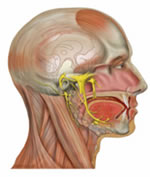 Common signs of Migraine:
Common signs of Migraine:
- Headache pain that lasts 4 to 72 hours
- Pain aggravated by normal routine physical activity place the diagram below here
- Nausea or vomiting (or both)
- Light and sound sensitivity
Potential treatment options for jaw discomfort and chronic headaches/migraines:
- NTI: is a removable appliance that works to relax the biting muscles of your jaw reducing friction and breaking the cycle of clenching and headaches. This custom-made device snaps over your bottom or top front teeth opening the jaw during sleep and reducing headaches of all levels.
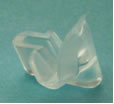 |
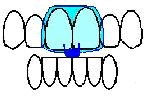 |
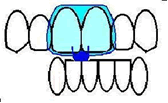 |
- Full Coverage Occlusal Guards: A full coverage guard helps to decrease biting forces on your teeth giving them a smooth surface to glide across while you are sleeping effectively protecting them from wear and damage that can occur at night. This type of guard has a range of benefits such as reducing popping and clicking of the jaw, lockjaw, chronic headaches/migraines and protects your teeth from the damage clenching and grinding can cause.
The Gentle Dentist
15055 22 mile Rd. Ste #2
Shelby Township, MI 48315
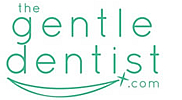
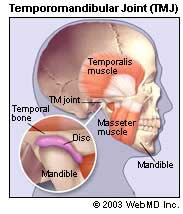 Pain or tenderness in the face, jaw joint area, neck and shoulders, and in or around the ear when you chew, speak or open your mouth wide
Pain or tenderness in the face, jaw joint area, neck and shoulders, and in or around the ear when you chew, speak or open your mouth wide